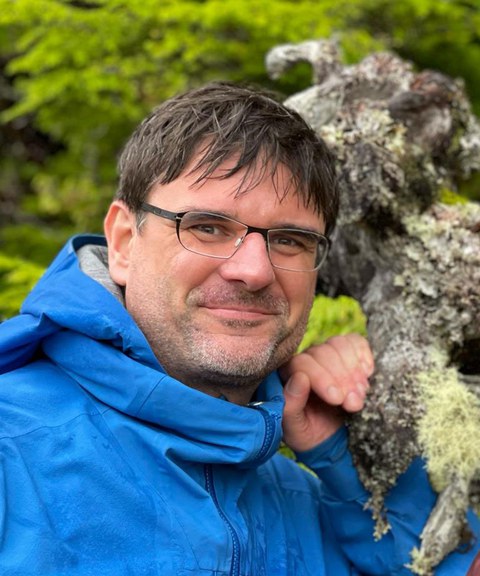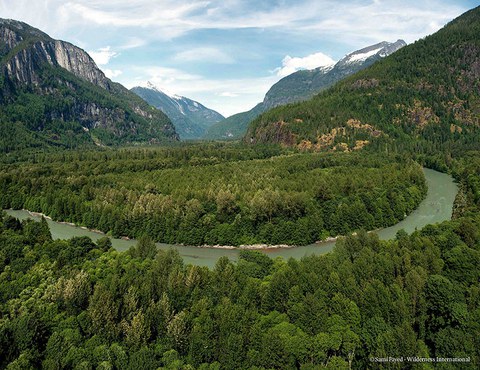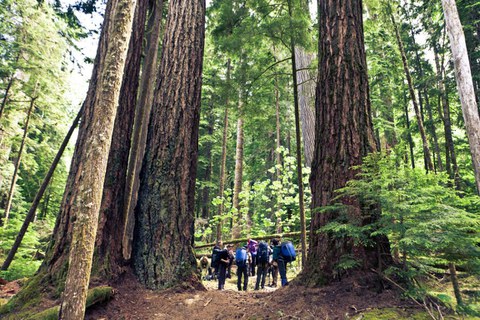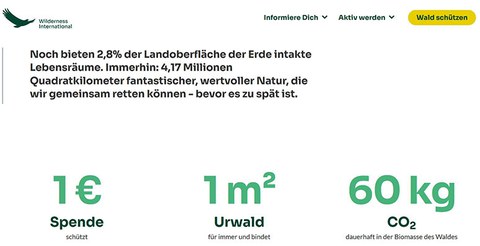Seeds sprout more easily with today's youth
(portrayed in 2023)
Dagmar Möbius
Anyone wishing to meet Kai Andersch in person in his home country will have to be patient. The forestry scientist spends many months a year traveling around the world. He is currently preparing an expedition to Lima to protect ancient Peruvian forests. "Kontakt-online" interviewed him via video conference between two flights in South America about his motivation, his career, Tarzan, and the seemingly vacant carbon footprint of TU Dresden.

Kai Andersch is founder of the NGO Wilderness International.
Kai Andersch has been fascinated by old trees since he was a child. The Dresden native enjoyed being in the woods. During a one-year exchange visit to Evansburg (Alberta), Canada, in 1994, the then 17-year-old saw trees much older than the ones in Germany. "You find peace," he says, describing his fascination. "And you are forced to think far beyond your own life." After graduating from the Kreuzgymnasium secondary school in Dresden and completing his civilian service, he began studying forestry at Dresden Technical University in 1998. "I deliberately chose the faculty located in Tharandt, the very birthplace of sustainability," he explains. It wasn't the proximity to his hometown: "If the degree program had been available in better quality at Oxford or Cambridge, I would have gone there." He wanted to learn a lot more about old trees, how to protect them, and how industrial forestry and forest conversion work.
"Tarzan would be proud of us"
Even before he began his studies, Kai Andersch had a plan: He wanted to start a nonprofit organization dedicated to protecting wild nature, especially old woodlands. In his second year at uni, he started the project with two fellow students and other participants, and founded an association. Today, the NGO is an international conglomerate, established by 31 founders with three sister organizations in Germany, Canada and Peru. Wilderness International purchases ecologically valuable and acutely threatened wilderness areas worldwide in order to preserve them for the future. He has an ambitious plan: "By 2050, we will protect the last 2.8 percent of our planet's remaining intact habitats through legally secure purchases." That's 4.27 million square kilometers of fantastic, precious nature that can be saved. "Tarzan would be proud of us," says the 45-year-old with a chuckle, and that's what is started on the foundation's website. As CEO, Kai Andersch focuses on transparent communication. Sponsors and donors should be able to see and understand where the money is going, and learn why forests need to be protected. For this purpose, drone footage is also be published. "We give people a chance to say thank you to nature," he said. Click here for the impact report.

"We are pleased to permanently protect this forest with our partners by land registration," says Mr. Andersch.
Education and research are fundamental
„"Research plays a fundamental role for us”, says the forestry scientist. "My studies were very diversified and laied a superb foundation. The lecturers did a great job." Kai Andersch remembers many anecdotes, collaborations and trips from his student years. He received a lot of support from Professor Dr. Otto Wienhaus. From him, he learned about "Terra Preta," a technique that has been used for thousands of years in the Amazon basin to bury charcoal, making soils nutrient-rich again and increasing their water storage capacity. He wrote and defended his Master's thesis in 2005 with fellow student Robert Spitzer on the ecology of one of the world's most valuable trees, the South American Letterwood.

Only through the comparison the dimensions in the jungle become clear.
Inflationary terms and a different approach
"The usage of the term sustainability is inflationary today," remarks Kai Andersch. "In my field, everything takes much much longer, you have to approach it very differently, you have to be tremendously resilient and you can't just take." Young people grow into doing things for the long term. The forestry expert met three of eight current trustees and councilwomen when they were still attending school. According to him, this approach differs from that of politicians who think in five-year stages.
Andersch and his eight-year-old son find it sad that his travels take weeks to months. "But last year I took him to Canada for the very first time. Children are more open to such topics, the seeds sprout more easily," in his experience. That's why he and the foundation, which currently has about 30 full-time positions, love collaborating with schools. The foundation held 100 to 140 events annually in pre-pandemic times. He and his foundation are also known in Dresden for the so-called rainforest runs that take place at many schools.
Applications are received spontaneously throughout the year, mostly through direct contacts. Ideas for Bachelor's and Master's theses are always welcome, for example remote exploration with satellites or drones, or on the quantification of ecosystem services.

1 € protects
Wishes for TUD
"The topic of sustainability playing a role in all degree programs," is something that Kai Andersch would very much like to see. But as a well informed member of the alumni network, he also knows: "There's not even a proper carbon footprint at TUD." Three years ago, he offered to create one (free of charge) for his alma mater. The project did not come to fruition. "I don't think many universities get that kind of offer. The sense of responsibility was not so significant then," he says pragmatically. He knows that there is still a long way to go in terms of climate protection. However, "It is a matter very dear to my heart that TUD also positions itself strongly on sustainability; it could be a pioneer." Of that, he ist convinced.
Editor's footnote
Greenhouse gas accounting for TU Dresden is currently carried out within the framework of TU Dresden’s EMAS environmental reporting. Up to now, emissions have been accounted for in accordance with Scope 1 and 2 of the Greenhouse Gas Protocol. Indirect emissions, e.g. from business trips, commuting and procurement processes (so-called Scope 3 emissions), have not yet been recorded. Expansion of greenhouse gas accounting is currently planned. In addition, climate protection management is to be established at TU Dresden in the future. Adoption of a sustainability strategy, with a comprehensive action plan for TU Dresden, is planned for 2023. (Here to the contact of the TUD responsible persons)
Contact:
Wilderness International
Kai Andersch
CEO
